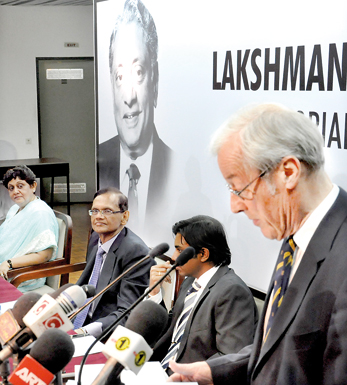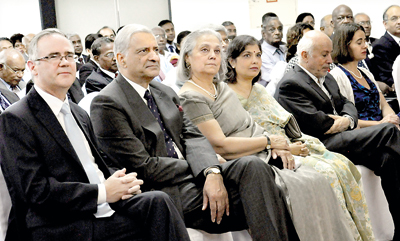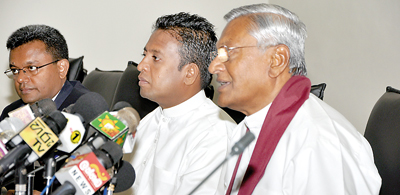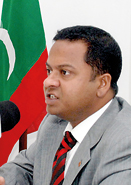News
Sri Lanka’s commitment to peace will unite C’wealth
= CPA chief Sir Alan says outstanding post-conflict issues need to be dealt with in a transparent manner
Sri Lankan Government’s willingness to demonstrate at home and abroad a clear time frame that peace will be accompanied by equality of treatment for all the peoples of this country will help to unite the fifty-four member states in support of Sri Lanka at the 2013 Commonwealth Heads of Government Meeting in Colombo, said Sir Alan Haselhurst, Chairman of the Commonwealth Parliamentary Association Executive Committee.

Sir Alan delivering the memorial lecture as Suganthie Kadirgamar and Minister Peiris look on.
Delivering the Lakshman Kadirgamar Memorial Lecture 2012 on ‘A Commonwealth for our future: The Parliamentary dimension’ at the Sri Lanka Foundation Institute on Wednesday, Sir Haselhurst said what will convince Sri Lanka’s friends was the Government’s continuing determination to address in a transparent way outstanding post-conflict issues.
Sir Alan and late Foreign Minister Lakshman Kadirgamar, both aspiring politicians, met at the Oxford Union.
Sir Alan said it was tragic that Mr. Kadirgamar did not live to see the end of the internal conflict and the start of peace-building to which so much of his life was dedicated.
“Many countries go through turbulence from time to time. Sri Lanka’s agony lasted too long. It is particularly tragic that Lakshman Kadirgamar did not live to see the end of the internal conflict and the start of peace-building to which so much of his life was dedicated”. “It seems certain that he (Lakshman Kadirgamar) would have been encouraged by the setting up of the Lessons Learned and Reconciliation Commission in May 2010 with its implied public commitment by the Government to address the issues of accountability and reconciliation,” he said.
External Affairs Minister G.L. Pieris and Suganthie Kadirgamar, widow of the Late Foreign Minister addressed the gathering. Excerpts from Sri Alan’s speech:
I have been asked questions about holding this year’s CPA Conference in Sri Lanka. The fact that I am here now indicates how those questions were answered. It would have been contrary to the approach which I have stated for us to have reneged on our acceptance of the invitation issued by Sri Lanka over two years ago. Many countries go through turbulence from time to time. Sri Lanka’s agony lasted too long. It is particularly tragic that Lakshman Kadirgamar did not live to see the end of the internal conflict and the start of peace-building to which so much of his life was dedicated. I am sure he would have welcomed the progress being made by the Government of President Rajapaksa towards the resettlement of the Tamil population displaced during the conflict.
He would surely have approved the lifting of the state of emergency and the rapid economic growth now being achieved. It seems certain that he would have been encouraged by the setting up of the Lessons Learned and Reconciliation Commission in May 2010 with its implied public commitment by the Government to address the issues of accountability and reconciliation.
The Government in July approved an implementation plan and timetable for the LLRC’s recommendations. This is a welcome move. Sri Lanka’s friends in the Commonwealth and the wider world will wish to see it reinforced through continuing progress to civil governance. It is also important to your friends to see thorough, equitable and satisfactory resolution of any outstanding concerns over human rights. The ultimate goal must be legal entrenchment of protections for the rights and political freedoms of every citizen of this country. All this requires the continuance of courageous and farsighted leadership. But something else is needed too.
I represent what might be described as the parliamentary column of the Commonwealth structure. It will perhaps be understood why I would place great emphasis on the role of parliament and parliamentarians in the process of reconciliation. Indeed they should be at the heart of it.
Parliaments alone have the mandate to question and investigate the actions of government ministers and officials, to goad and encourage them to make progress and to legislate as necessary. As an institution parliament is best placed to shine a continuing light on the recommendations of the LLRC, ensuring that there is adequate focus on and commitment to its findings. Parliament is also the body capable of ensuring that all parts of Sri Lankan society are engaged in the reconciliation process.
As a representative assembly it has a better chance than possibly any other constitutional organ of winning the hearts and minds of the most isolated and hard to reach communities.
I do not wish to appear to be trespassing on sovereignty. I recognise without equivocation that reconciliation and accountability will not be successfully achieved if the process is not led by the Sri Lankan Government and other institutions of the state. However, I would be failing in my own responsibilities if I did not talk up the Commonwealth resources on which Sri Lanka could draw in smoothing the path forward.
Sri Lankans have not been and are not alone in having to meet and overcome the challenges of post conflict reconciliation. There are members of Parliament in South Africa, Sierra Leone, Rwanda and Northern Ireland to name but four, who have firsthand experience, albeit in different circumstances, of peacebuilding and reconciliation. They could advise and encourage their colleagues in the Sri Lankan Parliament if that advice and encouragement were sought. Many Commonwealth countries have been through difficult periods of transition. There is much experience to share.
The journey from internal conflict to stable democracy often has to be undertaken along a rocky road. No-one should regret the defeat of the LTTE, but the wounds of such a long and bitter war are slow to heal. Economic development is an obvious help, but on its own is insufficient. A sustainable peace requires genuine reconciliation between peoples and that in its turn depends on an understanding and redress of grievances.
The peace process in other countries has proved to be most effective where governments have taken their own actions to ensure that they can be held to account by parliamentarians and organs of civil society. This therefore emphasises the value of the LLRC report and underlines the importance of the implementation of its recommendations. The Commonwealth as a whole and the CPA through its parliamentary network stand ready to support.
Between us, I emphasise your friends in the Commonwealth, we boast no inconsiderable resource, possessing expertise in promoting reconciliation between communities, addressing issues of land rights, providing constitutional and legal assistance and advising on models of devolution and local government.
CPA’s presence here in conference is testimony to our belief in your intent to embed our Commonwealth values deeper into your constitution as your settlement progresses.
The Sri Lankan Government has received another vote of confidence in the decision of the Commonwealth Heads of Government to hold their next gathering in Colombo. This was originally proposed when they met at Port of Spain in 2009 and the choice was confirmed last year in Perth.
However, what will convince its friends is the Government’s continuing determination to address in a transparent way outstanding post-conflict issues. In addition, its willingness to demonstrate at home and abroad a clear timeframe that peace will be accompanied by equality of treatment for all the peoples of this country. Simply put, transparency, peace and equality must be bolstered by democratic stability. Within the framework of our Conference, Commonwealth parliamentarians will look for assurances in these respects. A good outcome here will help to unite the fifty-four member states in support of Sri Lanka at the 2013 CHOGM.
I would be less than frank, however, if, as a friend of Sri Lanka, I did not point to concerns should the progress for which we all hope not be made. It would be singularly unfortunate if the international community was to lose faith in the will and ability of the Sri Lankan Government to resolve peacefully and collectively its domestic challenges.
This might put the Commonwealth itself in a delicate position for it would give ammunition to those critics who claim that it lacks the influence necessary to define itself as a major intergovernmental force. That said, I continue to share the confidence of the Commonwealth Secretary-General and so many others that Sri Lanka will succeed in its task.

Commonwealth Secretary General Kamalesh Sharma and other invitees. Pix by Susantha Liyanawatta
Indeed the CPA believes it can help. I have stressed the role of parliamentarians in the overall Commonwealth framework. It is my firm conviction that Commonwealth parliamentarians must establish themselves in a more influential position than they have achieved to date. I sense the door is now open for CPA to assert itself as a pre-eminent force for good. Indeed the Ministerial Action Group has signalled that the Commonwealth Secretariat should remit its parliamentary strengthening work to CPA. Specifically there is an opportunity to establish a legacy from our meeting in Colombo.
CPA can work discreetly with Sri Lankan Members of Parliament in a structured programme embracing capacity-building, post-conflict reconciliation and constitutional and electoral workshops to help them maximise their role in the delivery of peace and accord. Your friends, not without experience of similar issues, are ready to help. A Commonwealth for our Future in which Sri Lanka stands proud and strong.
A Commonwealth for our Future in which together we will grow in respect and influence. A Commonwealth for our Future in which the values of free speech, human rights and democracy are extolled and enhanced. And the Parliamentary Dimension of my title? This is to recognise that representative parliamentary democracy is the only reliable guarantee of freedom. Parliament is the bridge between government and the governed. Above all is the need continually to convince people that it is the best means by which their voices can be heard and ultimately in the face of deep scepticism, when privations appear overwhelming, it is still the best hope of their needs being met.
Follow @timesonlinelk
comments powered by Disqus

























